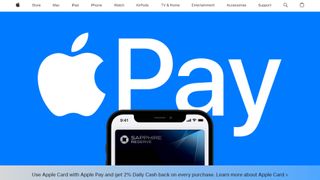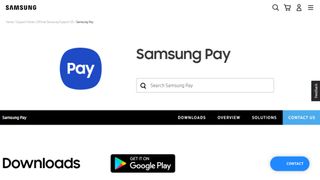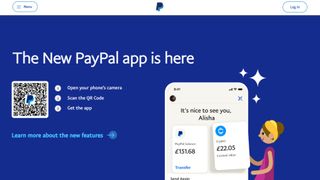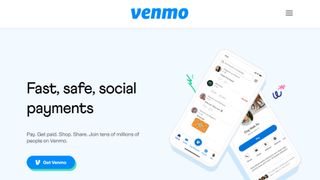Best mobile payment app of 2024
The best mobile payment apps for contactless payments
The best mobile payment apps provide an easy to pay for goods and services, and all by using nothing more than an app installed on your smartphone.

The best mobile payment apps of 2024 in full:
1. Best for iOS users
2. Best for Android users
3. Best for Samsung users
4. Best for web users
5. Best for Facebook users
6. FAQs
7. How we test
Mobile apps providing contactless payments have become common since the introduction of Near Field Communication (NFC), turning individual smartphones into the equivalent of a payment card.
Just as like contactless credit and debit cards, however, mobile payments have their limitations - but they also have their fees, and sometimes these aren't always so clear.
Therefore as mobile apps deliver on the promise of the digital wallet they are changing and expanding the way we pay for things in everyday life. They excel at small transactions, avoiding the need for having cash, and this can apply not just when shopping but also for everyday items.
However, as well as contactless payments, mobile payment apps can also be great for sending money to people you know, such as friends or family, or paying traders directly.
As contactless payment platforms continue to be rolled out, we'll help you choose the right mobile apps and NFC system that can work for you.
We've also featured the best mobile card payment readers.
The best mobile payment apps of 2024 in full:
Best for iOS users

1. Apple Pay
Reasons to buy
Reasons to avoid
Apple likes to make the complex simple, and easy for everyone to do, and their mobile payment offering, Apple Pay is true to that philosophy. There is no app to download, and it works on iPhones, and can be used for online purchases on Macs.
The user provides the credit card information to their Apple account. Then the iPhone is used for the purchase through a contactless payment method at a retail establishment, and it is considered more secure as the user has to verify identity via the Touch ID sensor or Face ID. Users can also easily send cash to each other via an iMessage, or by just asking Siri, the digital assistant. When you receive the cash, it goes to your Apple Pay Cash balance, which can be subsequently transferred to your bank account.
Apple Pay is accepted at about half of US retail locations, including the popular retail establishments of Starbucks, Walgreens, McDonald’s and Best Buy among many others.
Best for Android users

2. Google Pay
Reasons to buy
Reasons to avoid
The Android mobile payment app is Google Pay which comes preloaded on Android smartphones. It is accepted at many retail stores, including Bloomingdale’s, Chick-Fil-A, KFC, Nike and Staples, and also online services such as Airbnb and DoorDash. It claims to be more secure than using a traditional credit card as the card number is not directly sent, and protected via multi-layer security encryption.
Google Pay supports a number of credit cards from a number of the major providers, such as Chase, Citi, Discover and American Express. However, that debit card from your tiny credit union with only three branches is not likely to be on the supported list. However, there is a way to directly connect your PayPal account, and all Visa cards are supported via Visa Checkout.
Also confusing is the fact that to be able to send money directly to another user (person-to-person transaction), you need a different app: Google Pay Send.
Best for Samsung users

3. Samsung Pay
Reasons to buy
Reasons to avoid
With their market-leading Galaxy phones now common among users, Samsung also now provides their mobile payment app, Samsung Pay. It is supported on several of Samsung’s latest flagship smartphones, such as the Galaxy S9, but not on other manufacturer’s phones, limiting more widespread adoption. The Samsung Pay app connects to credit and debit cards from a number of major banks.
The good thing about Samsung Pay is the near universal acceptance as merchants do not need to opt into the program. Rather, Samsung Pay works with conventional credit card readers, using the newer EMV or NFC tech, or even the older ones using magnetic strip technology – by holding the phone next to it, the credit card information contained in the magnetic strip gets transmitted via a technology called magnetic secure transmission (MST).
With such flexibility in interacting with the credit card reader, Samsung Pay can truly replace that pile of credit cards in your wallet with a phone app.
Best for web users

4. PayPal
Reasons to buy
Reasons to avoid
It seems like PayPal has been around for eons when it comes to online transactions, and with their mobile app they want to move beyond just providing seller protection for online purchases.
These days, they want to deliver direct person-to-person payments, and furthermore, to get into the retail payment space, although you are still more likely to be able to pay online with this service than at the checkout counter. This is due to the lack of support for NFC with PayPal’s app, and only a handful of retailers jumping on the bandwagon to accept PayPal has hampered efforts to date.
A downside of PayPal has been the fees, which can be complicated and difficult to understand as there are so many of them. At least for buying a product online or in-person, PayPal does not charge a fee, nor does it charge for a person-to-person transfer (without seller protection), so you can send some cash to help split a check.
However, while transferring from a linked bank account does not incur a charge, with an Instant Transfer from a linked debit card, there is a transfer fee applied.
Best for Facebook users

Reasons to buy
Reasons to avoid
Venmo works via a mobile app on your smartphone, and signing up can be done with your Facebook account, if you prefer. Next, you link your bank account or credit card. Then you can use the app to send or receive money from other Venmo users, or you can send money via a phone number or email as the app can access your Facebook or phone contacts; and if the recipient is not currently on Venmo they are prompted to create an account.
Venmo is more useful for online payments, but a few retailers do accept it, including Forever 21 and Foot Locker.
Read our full Venmo review.
Mobile payment FAQs
How to choose the best mobile payment apps
Why you can trust TechRadar
There are some solid options if you're looking for the best mobile payment apps, as witnessed by the selection we have in this guide. We've picked out what we think is the current best of the bunch, in terms of quality and performance.
Convenience will probably be at the top of your shopping list, so you'll want to select an app that is user-friendly and centered around being used in the mobile environment. Simple is one thing, but free is another, which if you're looking for basic payment capabilities should be possible.
However, if you plan to use your mobile payment app to do things other than send money to family members, or pay for things on the go, you may want to look at subscription packages. These may offer more power tools inside the app for beefier mobile payment tasks.
How we test the best mobile payment apps
The best mobile payments are all about offering convenience. In which case, our primary reason for testing these handy chunks of software is to see how quickly and easily they let you pay for things.
We try the out the payment software on each platform the package is designed for, noting useful features and functions as we go. We'll check the stability as well as the reliability of transactions as they're processed. Knowing you've got an app that will handle your money without hassle or security issues is vital.
We've also kept an eye on any costs involved with the best mobile payment apps. Basic everyday transactions only require you to have a simple-but-effective app, but if you're looking for more functionality, the paid-for options might be worth a look. We've checked the value for money aspect of any included here.
Read how we test, rate, and review products on TechRadar.
Get in touch
- Want to find out about commercial or marketing opportunities? Click here
- Out of date info, errors, complaints or broken links? Give us a nudge
- Got a suggestion for a product or service provider? Message us directly
We've listed the best accounting software for small business.
Are you a pro? Subscribe to our newsletter
Sign up to the TechRadar Pro newsletter to get all the top news, opinion, features and guidance your business needs to succeed!
Jonas P. DeMuro is a freelance reviewer covering wireless networking hardware.

